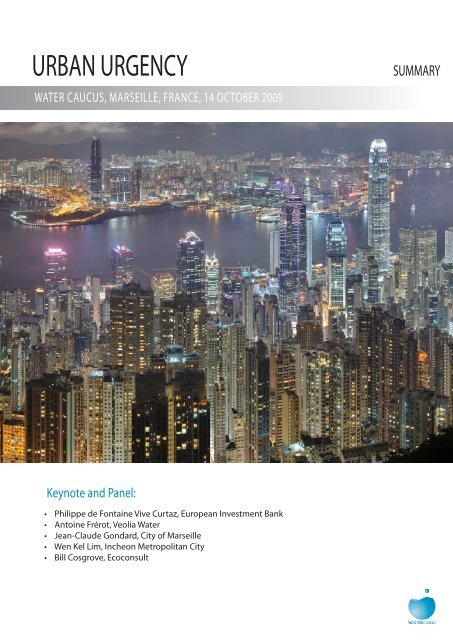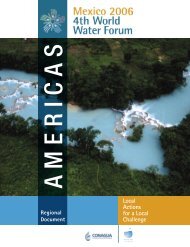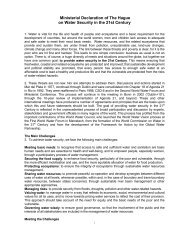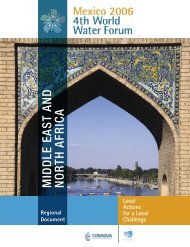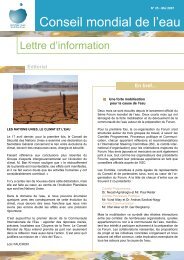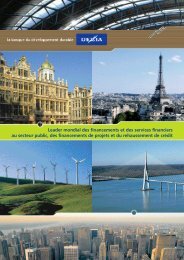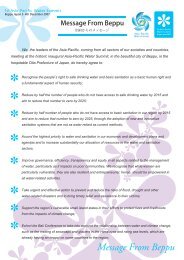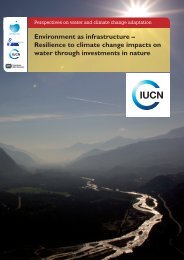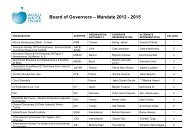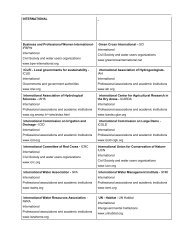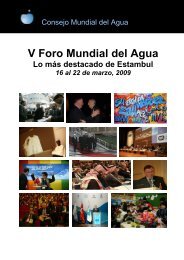URBAN URGENCY - World Water Council
URBAN URGENCY - World Water Council
URBAN URGENCY - World Water Council
Create successful ePaper yourself
Turn your PDF publications into a flip-book with our unique Google optimized e-Paper software.
<strong>URBAN</strong> <strong>URGENCY</strong><br />
SUMMARY<br />
WATER CAUCUS, MARSEILLE, FRANCE, 14 OCTOBER 2009<br />
Keynote and Panel:<br />
• Philippe de Fontaine Vive Curtaz, European Investment Bank<br />
• Antoine Frérot, Veolia <strong>Water</strong><br />
• Jean-Claude Gondard, City of Marseille<br />
• Wen Kel Lim, Incheon Metropolitan City<br />
• Bill Cosgrove, Ecoconsult
In introducing the Urban Urgency plenary session,<br />
Philippe de Fontaine Vive Curtaz, Vice President<br />
of the European Investment Bank, evoked<br />
some of the major urban challenges we<br />
are facing, such as poverty, aging populations,<br />
increasing inequalities in access to work, social<br />
integration and governance. Managing urbanisation<br />
is a difficult task within a constantly evolving<br />
context. Urban challenges are interlinked<br />
with challenges in other development sectors. In<br />
both water and urbanisation, the challenges and<br />
the solutions vary from one region to another,<br />
from one country to another and even locally.<br />
According to the United Nations, 50% of<br />
the world’s population lives in cities, and in<br />
2050, this proportion will rise to 70%. The<br />
world will be more and more urbanised, but<br />
an urbanisation characterized by poverty.<br />
It is probable that the process of urban concentration<br />
will slow in Europe. Conversely, in developing<br />
countries, urbanisation has progressed much faster<br />
and, hypothetically, this tendency will continue.<br />
According to UN projections, between 2007<br />
and 2050, the portion of the urban population in<br />
the planet’s least developed regions will increase<br />
from 28% to 56%.<br />
Philippe de Fontaine Vive Curtaz<br />
However, European cities will not be spared. Old<br />
cities in rich countries may have difficulties adapting<br />
to change, and many cities will be confronted<br />
with the problem of their centres becoming<br />
run-down. Managing these levels of urbanisation<br />
will be more difficult if capacities in spatial planning<br />
and management are limited.<br />
Intersecting urbanisation, water issues exacerbate<br />
the challenges. By 2030, 3.9 billion people in<br />
the world will live in water-scarce regions, which<br />
is 1 billion more than today.<br />
The panellists commented on this introduction<br />
with their perception of the challenges as seen<br />
through the prism of their own contexts, before<br />
raising other points for consideration.<br />
The city is often approached with worry, like an<br />
illness to remedy. However, none of the problems<br />
can be solved if it is perceived as a danger.<br />
Place for establishment, accomplishment, liberty<br />
and well-being, cities let people escape isolation<br />
and poverty, and at the same time, offer opportunities<br />
and possibilities to meet others.<br />
Since the influx of populations towards cities cannot<br />
be stopped, rather than condemning existing<br />
realities, methods for controlling urban development<br />
must be found, according to Antoine Frérot,<br />
Director General of Véolia <strong>Water</strong>.
To illustrate these points, two examples of cities, Marseille (France) and Incheon (South Korea) were<br />
presented respectively by Jean-Claude Gondard, Secretary General of the City of Marseille, and Wen Kel<br />
Lim, Director of <strong>Water</strong> Management Division for Incheon Metropolitan City.<br />
Marseille, a moderate city of 1 million inhabitants,<br />
has adopted a strategy that depends on<br />
three dimensions of sustainable development:<br />
economy, societal balance, and protection of<br />
the environment.<br />
The strategy supports the City and the neighbourhoods<br />
that comprise it in their efforts to<br />
combat social exclusion and environmental and<br />
climate problems. These actions also take into<br />
account the city’s good qualities.<br />
Marseille has a strong tradition of water knowhow,<br />
in terms of supplying good quality drinking<br />
water; in terms of sanitation, since a new<br />
treatment plant was inaugurated in 2007; and<br />
in terms of risk management, especially with regards<br />
to flooding.<br />
The recurring questions of financing and technical<br />
solutions are necessary for achieving the<br />
designated objectives.<br />
Incheon, a megacity of 7 million inhabitants, has<br />
undergone super-urbanisation. <strong>Water</strong> availability<br />
has diminished over the past decades in Korean<br />
regions, which has engendered increased<br />
awareness of users who today use less water.<br />
But, Korea has also experienced extreme events,<br />
provoking heavy flooding. To adapt to this hydrological<br />
context, Incheon further developed<br />
desalination, treatment and reuse of wastewater,<br />
as well as rainwater collection. The City hopes to<br />
treat 100% of its wastewater by 2015.<br />
Balanced spatial planning requires human-sized<br />
cities. To refine thinking and find better adapted<br />
solutions, a distinction must be made between<br />
big cities and those that are designated as secondary.<br />
Because they offer comfort and equity, collective<br />
services, including first and foremost water and<br />
sanitation, are a factor of attraction. Regardless<br />
of the size of the city, these services should be<br />
accessible to all, including to newly arrived inhabitants<br />
so that they may become totally integrated.<br />
Antoine Frérot recalled that equality of access<br />
to these services reinforces social cohesion,<br />
security and citizenship.
Comments received from the floor helped to situate the subject within a wider framework. They recalled:<br />
• the role of virtual water;<br />
• the limitations of policies related only to the<br />
offer and the need to balance offer and demand;<br />
• the need to reinforce rural zones, whose situtions<br />
are at the origin of the exodus towards<br />
cities, and to consider the territory as a whole;<br />
• the importance of planning, roadmaps, spatial<br />
planning and decentralization;<br />
• the need to develop the capacities of personel<br />
in charge of these issues, financial engineering<br />
and the quality of governance;<br />
• financial innovation;<br />
• the importance of citizen participation.<br />
The participants also proposed that a theme on global spatial planning be included in the next <strong>World</strong><br />
<strong>Water</strong> Forum. It was concluded that solutions to urban challenges must be adapted to each context and<br />
to the size of each city.<br />
cc creativecommons.org<br />
WORLD WATER COUNCIL - CONSEIL MONDIAL DE L’EAU - CONSEJO MUNDIAL DEL AGUA<br />
Espace Gaymard - 2-4 Place d’Arvieux - 13002 Marseille - FRANCE<br />
Tel: 00 33 (0)4 91 99 41 00 - Fax: 00 33 (0)4 91 99 41 41<br />
www.worldwatercouncil.org


